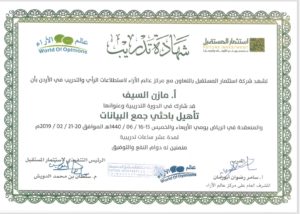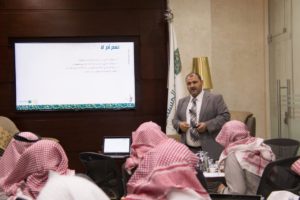The World Opinion Center for Opinion Polls, in cooperation with Future Investment Company, concluded a training program on how to conduct Opinion Leaders Surveys, presented by the center’s General Supervisor, Dr. Samir Abu Roman, in Riyadh from February 20-21, 2019, corresponding to 15-16/6/1440 Hijri.
The training program included several modules that covered: an introductory overview of opinion polls, their importance, types, and implementation methods, with a focus on the specifics of surveying opinion leaders and elites, particularly experts and specialists in the field of endowments. It also covered data collection phases, the importance of training researchers, general guidelines for researchers, instructions on handling refusal to participate in surveys, excuses, and suggested handling mechanisms, situations researchers might face and how to deal with them, ways to increase response and participation rates, understanding the psychology of respondents and using psychological principles, report writing by researchers, and criteria for evaluating researchers.
The program addressed the topic of opinion leaders as an important concept for both practitioners and academics in modern society. Numerous studies have been conducted to determine the strength of “opinion leaders,” identify the characteristics that distinguish them, and understand how they exert personal influence to change public opinions and behaviors. Many of these studies have shown that opinion leaders indeed exist and influence others in various fields, from fashion and consumer decisions to political realms. Opinion leaders are sometimes referred to as “influencers,” as they are often individuals with expertise and knowledge in a specific subject. These individuals frequently provide information and advice to “followers,” making their opinions likely to influence others’ behaviors through word-of-mouth communication. Several theories have emphasized the pivotal role of opinion leaders in shaping public opinion, including the “Opinion Leadership” theory, discovered and formulated in the 1940s, primarily used in marketing. The two-step flow theory also highlighted that influence occurs in two steps: information flows from media to opinion leaders and then from opinion leaders to their followers. However, the latter theory faced criticism for suggesting that opinion leaders in the initial flow stage are influenced rather than influencers.
Numerous characteristics of opinion leaders have been identified through studies on the subject. Despite extensive research, the challenge of identifying suitable opinion leaders for practical purposes persists. Various methodologies have been employed to accurately identify suitable opinion leaders, taking into account societal differences, social conditions, cultures, and variations across fields. Notable methodologies used to identify experts and opinion leaders in the field of endowments include:
– Positional:
– Reputational:
– Self-designating:
– Sociometric measurement:
– Observation:
– Key informant approach:
At the end of the program, participants discussed the criteria for experts and opinion leaders in the field of endowments, highlighting:
– Holding a postgraduate degree related to endowments or having two peer-reviewed research papers on endowments.
– A minimum of 10 years of practical or administrative experience in the field of endowments.
– Being renowned as a reference in the field of endowments.
– Having served or currently serving as a custodian of endowments for no less than ten years.
– Having served or currently serving as a judge handling endowment cases.
– Having served or currently serving as a lawyer in endowment cases.
– Having taught a course on endowments and their rules in higher institutes or universities.






